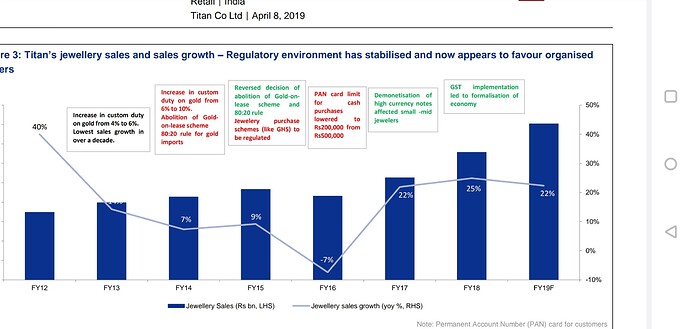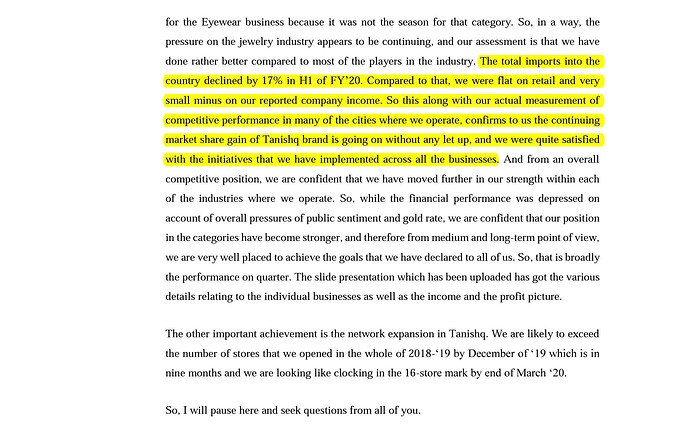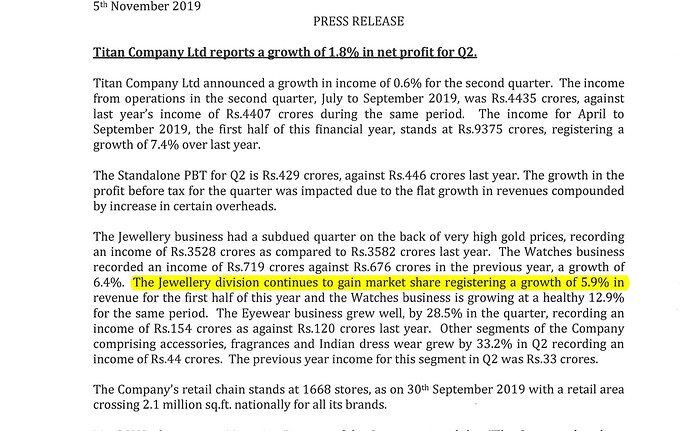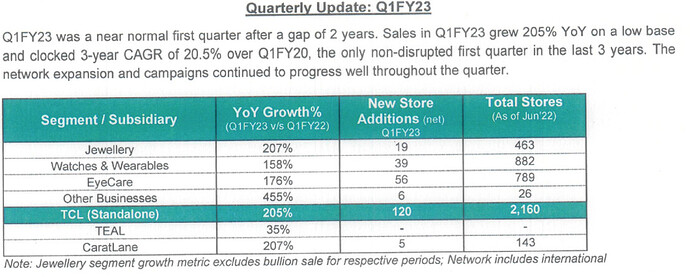Discl: Invested and biased
I don’t know if this has already been discussed earlier.
Going through the Q4Fy22 Titan Concall, came across a very interesting point. Now, because of hallmarking at the place of manufacturing rather than at the point of sale, the competitive advantage (Trust factor) that titan has vanished overnight as everyone has to sell the same quality of gold. The management says, the unorganized was offering 19-19.5 carat till now and when they move to 22 carat due to compulsory hallmarking, they have to raise 8% making charge to make up for that. Now titan becomes competitive on pricing and not on the trust factor. Now, since Titan already prices the gold at a premium, when others rise the prices it becomes a level playing field for everyone. I feel except for the brand pull, the competitive advantage has come down. when trust is no longer the unique value proposition would the brand value alone be enough to pull the customers, given the competition has increased a lot in the last 2 years?
It is like this. There are 5 people in town. 1 is honest and well known and 4 crooks who are less known. People deal with honest person for obvious reasons. Law agencies get tough and force other 4 also to behave in non-crooked way. Now will people suddenly start doing biz with other 4 till honest-well known person goofs up.
While I agree to your doubts and I did have same when I first heard news but on thinking deeper, although I am not aware how hallmarking and all actually works or would work in future but what I am aware is that inspite of many rules/regulations, there are always malpractices/frauds…as a naïve customer how would I know if the hallmarking itself is genuine and not tampered with…where people are known to find and use loopholes, I would still prefer to look for trust…
Although not comparable, but when a highly regulated sector like pharma can have so many process/FDA issues in well known leading companies…just because hallmarking regulation has come up, how can I trust any unorganized player to be following that honestly without any tampering? If someone has insights, more details welcome.
Disc: Tracking position, gradually building
Titan may not be charging Gold at a premium… Gold rates are usually common for all Jewellers on a particular date.
The difference in the rates is on the making charges where Titan or other reputed Jewellers always seem to look costlier compared to a local jeweller. Even if a product has an MRP, the companies tend to reduce rates as they can play with the making charges. As mentioned the Unorganised sector sold 19.5 carat gold as 22 Carat ( you will always find mixing in their gold). If you exchange it at the same store you will get full value of gold, if from some other store, they will deduct more. And hence it was easier for the Local guy to charge lower making charges.
With Hallmarking, the Unorganised sector tends to lose this advantage… its a Win-Win for the customer and Organised sector stands to gain more market share due to this as the price gap will further reduce.
Gold rates are not same across all jewellers/whole country. Gold rate charged by Tanishq is not same as gold rate charged by Malabar Gold or any other local jeweller.
I enquired about nearly 10 jewelry stores (All organized) and found that Titan is charging at least Rs.20 per gram more than the competitors (Malabar, Kalyan, Lalitha, Bhima, etc.,). No two stores had the same gold rate on any given day.
Coming to making charges and quality you are correct. I recently experienced that when melting the old gold, the quality was poor and got only Rs.4000 per gram rather than the day price of Rs.4680. Yes, the people are moving towards organized retailers.
What I have observed is there are at least 2 or 3 local infamous and trusted saree ships or luxury shops in every city that used to sell adjacent products that have entered into jewelry in the last 2 years and eating away the market share. Since they already established trust with locals for the last 2 decades, I feel It is no longer about the unorganized vs organized but about competition in the organized space.
For example, My mother used to buy exclusively from Tanishq for the last 15 years, for the first time purchased gold from the local infamous saree shop(where she used to shop for other products) that got into jewelry and is recommending it to everyone as they already established trust in other products for more than a decade and are charging less making charge, running attractive promotions by giving the same purity as Tanishq to gain making share. They even have machines just like Tanishq to prove the quality. As Tanishq is entering into adjacencies and so are the adjacent shops entering into jewelry.
I am wondering, whether the market is big enough for everyone to win?
Valid point. I would say yes.
If there is no making charges difference and if trusted local related businesses are venturing into gold, I guess this trust will work, more so in towns, where there are only a handful of such trusted names in any given business. Perhaps this is not the case with cities. One could compare this particular aspect between Titan and Thangamayil. I don’t know if Titan exists in places, where Thangamayil exists, if so, how is business for both these brands? But here again, we cannot generalize, in the sense that, designs of the jewellery could be different, so customers may purchase from both. And there could be a difference between the customer groups, middle class, upper middle class etc, who prefer one over the other.
I think there is the possibility of not gaining market share from towns, as more and more trusted local brands may venture into gold, who would not give away that particular locality’s market share to Titan. On the other hand, if no such local brands come up, and there is a brand like Titan nearby, people would go there and buy.
So I can broadly say that, as this is gold, I think people would be willing to pay more, because of the trust factor, and once that is over, the designs, the number of such designs available within their purchase limit etc come to play a big role. After all, if a woman knows that she is buying pure gold without any dilution, then all that matters is the design, the look, she would not talk about the brand but talks about the ornament. So in that sense, no moat like Apple here.
I am yet to know what the management thinks about this fragmentation, perhaps this has always existed, and will continue to exist in a country like us, but still brand pull exists and is growing.
Have a position in Titan.
We are ignoring diamond jewelry where margins are high and needs trust. Doubt if small towns trustworthy shops can have that much working capital to have different designs. Titan can move inventory across stores in India and abroad so that customer has wide choice.
That is true, diamond and precious stone jewellery is an entirely different segment, that caters to different customers, and these customers I believe will visit big branded stores. And here too, Titan is not the only choice, they have many.
And small town shops do have different designs, and by small, we mean the size of the towns and not the shops, there are bound to be decent sized shops in these towns, who could be in the business for decades with loyal customers, so these shops provide nuanced designs, and the makers know which designs move, and they always bring in new designs, as they are experienced.
Moving inventory is not always beneficial, just like food we have innumerable tastes with jewellery too, so what clicks in North does not work in South. Even educated women from towns don’t try different things as much as educated urban women. Here local players come into play. Of course, if even they are not satisfied with the designs, then they will not buy.
If the market is really big enough, that even if it is fragmented between local brands and big brands, towns and cities, target customers, then all can grow, and Titan will also thrive.
On a separate note, excluding the trust part, it is the variety in designs, nuanced making, that get repeated customers, not the brand.
Have a position, yet to get convinced to increase that position beyond a point.
Just one addition, brand is the trust. So, it is the brand which one looks for.
Another factor is the craftsmanship. The intricacy and perfection of a Tanishq product may not be found in even big shops of small town. hence, the brand is also important IMO…Plus a leading brand can introduce various innovative aspects as and when needed.
Local designs do matter but even rural India now have global ambitions. A Tanishq can offer them digital exposure to the designs that they would eventually sell in the fashion streets of France and ship them to their nearest store to experience true globalization…just an example what a brand can do and hence brand does matter…
I said that, if we keep the trust aside, brand alone does not always bring back customers. Depending on the importance of occasion, the availability of many designs may still feel inadequate. More number of designs available, with nuanced craftsmanship, if these don’t exist, I don’t think a woman would purchase any ornament just because she has always purchased from that store before. I think some people don’t feel good even with electronic items, and jewellery is entirely about aesthetics.
And brand not necessarily is trust. Local shops which have been doing transparent business without any loss to customers, even if don’t have a name are trustworthy, more so in a business like gold, as they have customers who are buying for decades. If these local shops cannot compete with bigger players with the changes that have happened in the last few years, then there is a shift.
Entire Europe may behave the same when it comes to fashion, but not India, as we are very diversified in our tastes, including the things that we see, a part of is cultural, a part of it is nurtured. Education, there by migration to bigger towns and cities do bring changes in perception regarding fashions, but true rural folk remain the same, as far as traditional jewellery go. One other aspect is the possibility of providing the items without taking full payment, customers who are trustworthy, are short to some extent, the local shops may still give the item and collect the liability later.
And if the market is divided between the local trustworthy players who can maintain their market share, then perhaps Titan will grow as it caters to bigger geographies, different groups of people, if not, small town folk too would travel to a nearby branded stores and they could be any other big names, not just Titan.
My perspective is that of a customer’s, I am yet to know what management has mentioned about such intricacies and nuances and if such fragmentation does really exist from the management’s point of view or not.
Antithesis are not properly discussed.
- Change in the tastes of customers
- Change in behaviour
- Only Past performance is discussed…no future scope or future business performance expectations are discussed. It makes it difficult to arrive at some concrete decision…It should not become a value trap
Biggest antithesis in my humble view remains a similar incident to what we had in the past linked to ban on gold lease
Taste and preference changes, if Tanishq has 90%+ own designer’s. Might remain ahead of the curve. Thanks for the feedback ![]()
In companies like Titan or Asian Paints. Everyone will arrive at a different Valuation given their perspective of investing. Upto each to decide risk and reward.
This is the real risk which just played out with the government hiking the import duty on gold:-
Rest of the risks are extremely long term in nature and have lower probability of playing out. Govt playing around with regulations has happened too many times and thus was the real risk
One question here, this is an industry wide risk. Isn’t it actually helpful for bigger players like Titan as it will lead to further margin erosion for smaller players. With GST implementation, tax evasion is becoming difficult for smaller players. In an even playing field, shouldn’t such restrictions actually help market consolidate further?
Ideally it should in the long term. Just creates uncertainty in the short term, if one studies the sector. They will see in every 3-4 years there’s some event like this. Here’s a chart on the same:-
One way to see is similar event in recent past ( july 19 was when last significant import duty hike occurred), Titan Tanishq ended up gaining mkt share.
What we also need to remember is Titan sourcing is sub 40% on fresh bullion , rest being exchanges/ GHS etc. Studded in mix helps to keep margins in control.
May 22 was a bumper month for Jewelllery biz and even if July 22 sees slow down like it did in July 19 due to duty hikes. Q3 20 was back to double digit growth, so should be the likely case for Q3 22 - today’s Titan is much stronger with Jewelllery biz winning at scale and non Jewelllery businesses picking up well with a clear growth strategy.
Another difference could be is global recession scenario keeping gold price in check, thus partly diffusing duty hike impact.
Similar views here
Invested





